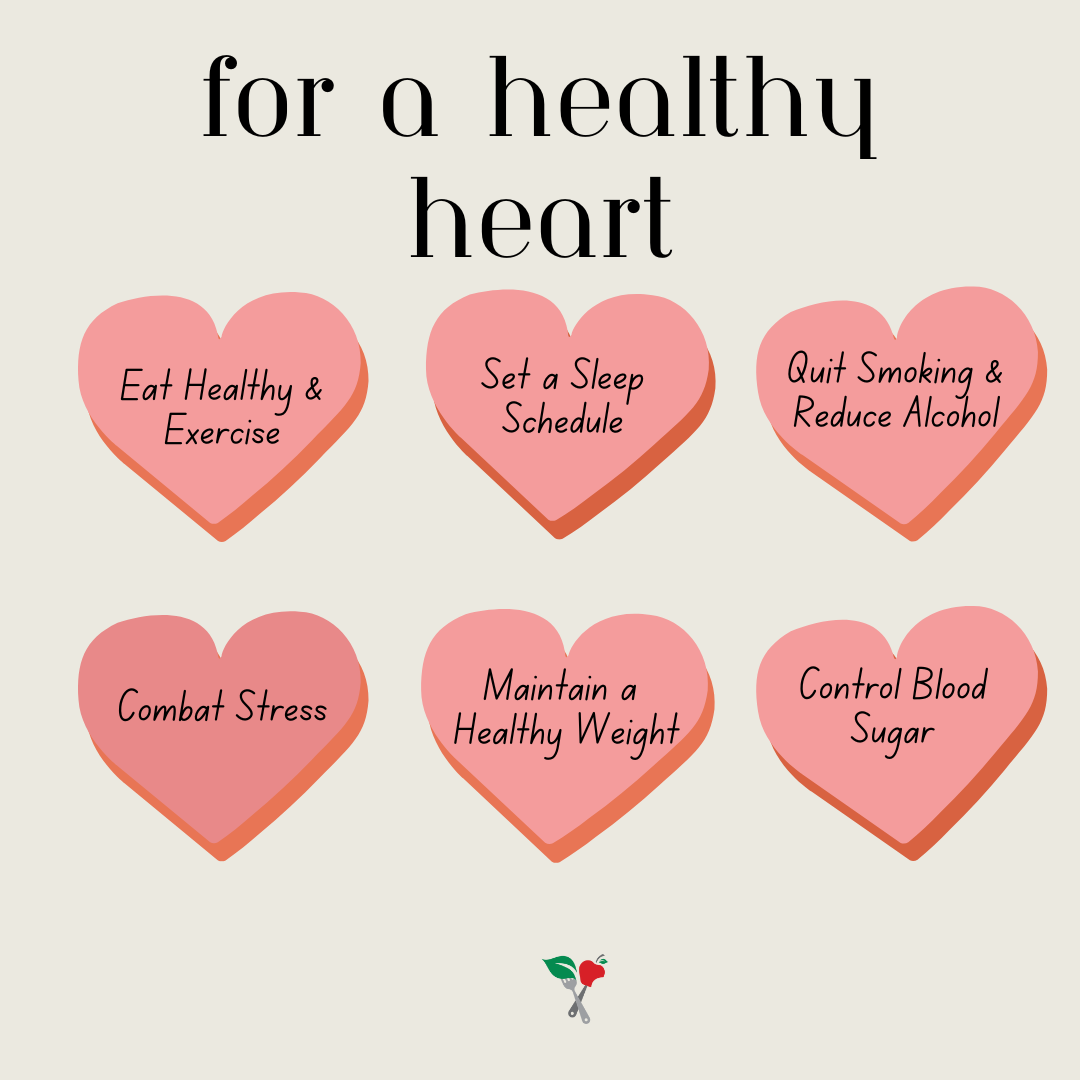Lowering Your Risk for Stroke and High Blood Pressure
Healthy eating and regular physical activity are important steps to take to help keep yourself healthy and prevent diseases, such as high blood pressure and stroke. High blood pressure and strokes can occur because of a variety of reasons, some of which you can and others that you cannot control. May is High Blood Pressure and National Stroke Awareness Month, a good time to learn ways to improve your heart health through simple lifestyle changes to lower your risk.
While we cannot control our family history, age, or gender; you can control many factors that lead to a healthy heart. Heart disease is the number one cause of death in America, affecting about eighty-six million people. It is estimated that 47% of US adults have high blood pressure, many of which do not even know it. While these numbers are very high, it is important to recognize that there is a lot we can do to help prevent heart disease and lower these instances. Read on to learn more about what you can do for your ticker.
Factors Within Your Control
Physical Activity. Most Americans do not get the recommended amounts of physical activity. The guidelines encourage at least 150 minutes of moderate physical activity or 75 minutes of vigorous exercise each week. If your blood pressure or cholesterol is high, the American Heart Association recommends 45 minutes of exercise three to four times a week.
Regular exercise helps improve heart health in a couple different ways:
- Naturally lowers blood pressure and stress levels.
- Helps burn excess energy to support a healthy weight.
- Improves insulin sensitivity (lowers blood sugar) for up to 72 hours.
- Strengthens the heart muscle.
- Boosts “good” HDL cholesterol.
- Lowers “bad” LDL cholesterol and triglycerides.
Sleep Schedule. New research in the journal Hypertension from March 2023 found that people with irregular sleep patterns have a higher risk of high blood pressure, even if they were getting the recommended amount of sleep each night. The researchers found that people who slept in on the weekend or had different bedtimes or wake times throughout the week were significantly more likely to have high blood pressure. The American Heart Association recommends 7-9 hours for adults and this new research shows the importance of sticking to a regular sleep schedule.
New statistics for 2023 show how important that 7–8-hour goal of sleep is. They found that every 1 hour decrease in sleep below 7-8 hours was associated with a 6% increased risk of total cardiovascular disease and every 1 hour increase above 7-8 hours was associated with a 12% higher risk.
Cigarette Smoking. Tobacco use, whether its cigarettes, vaping, cigars, or smokeless tobacco increases the risk for heart disease. Even exposure to secondhand smoke can impact your risk. Smoking raises blood pressure and heart rate and can increase the risk for a blood clot. It may also lower good “HDL” cholesterol too. The risk for heart disease and stroke lowers after quitting, so setting a goal to become smoke-free is a major step you can take to lower your risk.
Healthy Diet. A heart-healthy diet can help to naturally lower your blood pressure, cholesterol, and decrease inflammation.
Eat More:
- Plant-based foods, such as vegetables, fruits, whole grains, and nut/seeds. Fiber in plant foods can help to naturally lower cholesterol, reduce weight, and often these foods have little sodium. In 2017-2018, less than 10% of adults in the United States met the guidelines for whole grains, fruits, and non-starchy vegetables daily.
- Lean proteins, such as skinless poultry, fish, and beans. Aim to eat fish at least twice a week. Salmon, trout, and herring are the highest in heart-healthy omega-3 fatty acids.
- Healthy sources of fat, such as olive oil, avocados, and nuts/seeds.
- Unless you have kidney problems which require you to limit potassium, adding more potassium-rich foods to your diet can have a positive impact on your blood pressure. One study found that people who ate a high sodium, low potassium diet had a higher risk of dying from a heart attack and those with a higher potassium intake had a 20% lower risk of dying. Potassium can lower the effects of sodium on blood pressure. Foods like citrus fruits, potatoes, avocados, tomatoes, and dairy products.
- Dairy items include calcium, magnesium, and potassium which can help to regulate blood pressure. Focus on low-fat or fat-free dairy as a daily addition to the diet.
Eat Less:
- Limited saturated & trans fats found in high-fat animal products and many processed foods. Avoid food with partially hydrogenated oils.
- Red meat. If you choose to eat red meat compare labels and select the leanest cut.
- Reduce drinks and foods with high amounts of added sugars such as soda, fruit drinks, sweets, and desserts.
- Cut back on foods with excess sodium. For high blood pressure, it is a good goal to eat less than 2300 mg of sodium per day, at times reducing further to 1500 mg per day is recommended.

Maintain a Healthy Weight. Another important step is to make sure you are consuming the proper number of calories to help maintain a healthy weight. Carrying extra weight, especially around the abdomen, increases the strain on the heart. This excess weight can increase cholesterol, triglycerides, blood pressure, and lower the “good” HDL cholesterol. Losing even ten pounds has been shown to improve “bad” LDL cholesterol and blood pressure. Seattle Sutton's Healthy Eating's calorie-controlled meal plans are designed to be nutritionally balanced while following the guidelines from the American Heart Association to help you reach and maintain a healthy weight.
Excess Alcohol. Drinking alcohol raises blood pressure and can lead to higher triglycerides, heart failure, or stroke. Abstaining from alcohol or cutting back is a key step to take and can also help in other areas as well. Regular alcohol intake can contribute empty calories to the diet, which could impact the overall healthiness of your diet while also impacting your weight. It is also a known carcinogen and can impact your liver health and sleep, all important considerations for any regular drinker.
Blood Sugar. A diagnosis of diabetes increases your risk for heart disease by almost 50%. Over time, high blood sugar can damage blood vessels and nerves that control your heart. People with diabetes have a higher risk of dying of a heart attack, meaning controlling your blood sugar with a diet that is not only carbohydrate-controlled and balanced, but also heart-healthy is vital.
Stress. Stress can increase blood pressure, but it also can lead to unhealthy coping mechanisms that can negatively impact your heart such as many of the things already mentioned: drinking alcohol, smoking, poor sleep, lack of exercise, and overeating. Taking steps to lower stress and developing healthy ways to cope can help you reduce the overall impact. Focus on a healthy diet, sleep, exercise, take time to do things you enjoy, talk to supportive people, and see a mental health professional if you need more help.
Factors Out of Our Control
Family History. Your risk increases if you have a family history of heart disease. Examples of family history include having a mother or sister who have had a heart attack or sudden death before the age of sixty-five or a father or brother before the age of fifty-five.
Age. Getting older increases your risk for heart disease. Specifically, after women go through menopause their risk increases due to changes in cholesterol levels. About 65 percent of people over 60 years old have high blood pressure.
Race. African Americans, Mexican Americans, Native Americans, and some Asian Americans are most likely to have higher blood pressure.
Even if you are at risk for heart disease there are steps you can take to help lower your risk and improve your overall health. Remember, small changes really do add up. You do not have to change everything at once, but it is important to take steps that feel manageable and maintainable over time to help control your future. Some small changes to start with include adding a 10-minute walk each day, set a daily bedtime, adding a fruit or vegetable to one or two meals, cutting out sugary beverages, opting for water instead of an alcoholic drink, and letting Seattle Sutton’s Healthy Eating help decrease your stress, give you some extra time daily to do more of the things you love, and are heart-healthy and portion-controlled to support your good health!

